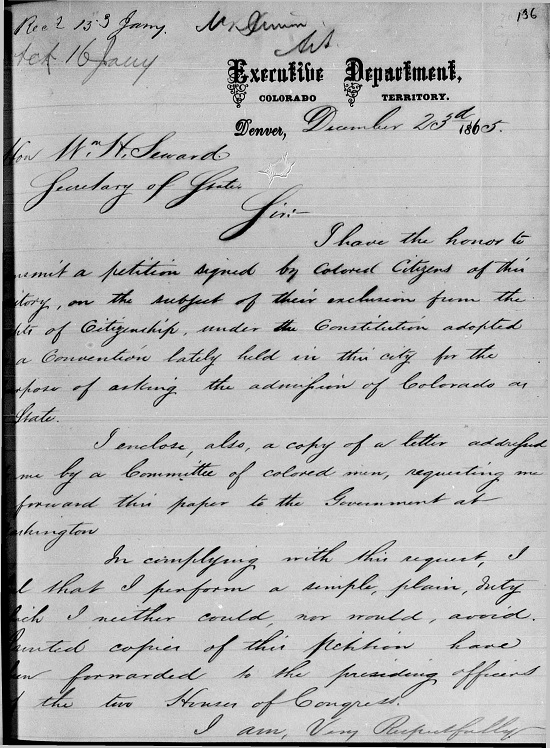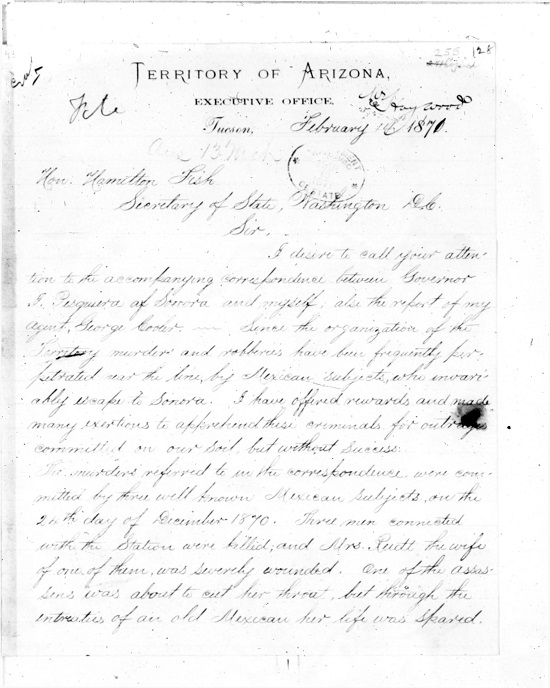‘The Language and Sentiments of Treason’: Highlights from Territorial Papers of the United States
The February release of Territorial Papers of the United States, 1765-1953, includes a Civil War-era warning of an impending invasion from Texas, a petition to allow black suffrage under the Colorado constitution, and reports of murder and robbery on the Mexican border.
Address of Legislature to Citizens, on Invasion from Texas, January 29, 1862

In 1862 Confederate General Henry Hopkins Sibley led a brigade of volunteer cavalry to invade the Territory of New Mexico. By advancing north along the Rio Grande from Fort Bliss, he hoped to eventually seize the gold and silver mines in Colorado. In the days leading up to the attack, the Territorial Legislature of New Mexico issued an address to the citizenry, warning them of the coming incursion and alerting them to the dangers they faced.
This enemy is Texas and the Texans. With their hostile armed regiments, rebels to the Government of the United States, to whose protection and flag, our good faith, our duties, our confidence, interests and hopes turn and belong, they have come upon us, in violation of every principle of right, of justice and friendship. They threaten you with ruin and vengeance. They strive to cover the iniquity of their marauding inroad, under the pretence, that they are under the authority of a new arrangement they call the Confederacy, but in truth it is a rebel organization. But this pretence cannot deceive. They come to subsist upon the substance of our property and industry. They are without money or credit.
They come to destroy the Government under which we have lived, prospered, and been happy, and whose protection and care we need. They come to turn from their places, those in offices and authority among you, and to erect by military despotism alone, a power to oppress, to harass and crush you.
The legislature’s warning continues, noting that the ideology of the invaders is in opposition to the beliefs of the people of the Territory of New Mexico.
We are a free people, and our fathers ever abhorred negro slaves and slavery. Our enemies found their rebellion upon pretences touching the negro, negro slaves and slavery. They have set up their rebel organization upon those elements, and boast in the face of a Christian world, of their skill and wisdom in building upon such foundations.
We have condemned, and put slavery from among our laws. It is not congenial with our history, our feelings or interests. The marauders come to destroy our enactments, and force upon us by the canon and rifle, slave institutions, against our will, protests and tastes.
We have no interests to promote, by being drawn within the destinies of the rebels and rebellion. All in that direction is danger and ruin. Listen not to their agents or emissaries, whether sent for mischief, or shall be found as traitors, living among us. In the midst of our wrongs and dangers, neutrality is without excuse. He that is not for us, is for the rebels and rebellion and his sympathies favor the invaders. The Texans may circulate their seditious papers and proclamations, by traitors to us among our people. Be not deceived by these pretensions. Put far from you, the language and sentiments of treason. Touch not the poison. A serpent’s fang is in it.
A. Cummings to Secretary Seward. Encloses Documents, December 23, 1865

During the beginning of the American Civil War, Alexander Cummings (1810-1879) served as a purchasing agent for the U.S. War Department. He was soon discharged for ineptitude and profiteering after it was learned that he had squandered most of his department’s budget. In 1864, while serving as Superintendent of Colored Troops for the Department of Arkansas, he was brevetted to the rank of Brigadier General. In October 1865 President Andrew Johnson appointed Cummings to the governorship of the Territory of Colorado.
On December 23, 1865, Cummings transmitted a collection of documents to U.S. Secretary of State William Seward. Included was “a petition signed by colored citizens of this territory on the subject of their exclusion from the [rights] of citizenship, under the constitution adopted by a convention lately held in” Denver. The petition stated:
The Petition of the subscribers, colored citizens of Denver and in the Territory of Colorado, respectfully showeth: That the State Constitution, framed by a citizen’s Convention, and adopted by an almost insignificant majority of the legal voters of Colorado, preparatory to admission as a State, excludes all colored citizens of the Territory of Colorado, from the right of suffrage by the incorporation in that instrument of the words, “all white male citizens,” thereby making color or caste and not intelligence and patriotism, the test for the right of suffrage. In view of this gross injustice on the part of the framers of the State Constitution of Colorado, founded on prejudice against color alone, we, your humble Petitioners, beseech your Honorable Body not to admit the Territory as a State until the word white be erased from the State Constitution.
A.P.K. Safford to Secretary Fish. Murders, etc. often Committed near Mexican Line by Mexicans, February 14, 1871

Anson Peasley Keeler Safford (1828 or 1830-1891) was Arizona Territory’s third and longest serving governor. Known as the Father of the Arizona Public Schools, Safford is also notable for granting himself a divorce. In Safford’s communication to U.S. Secretary of State Hamilton Fish regarding homicides near the Mexican border, he includes an open letter he transmitted to the Arizona Legislature on Feb. 7, 1871.
In consequence of the brutal murder of three citizens at Mission Camp Station, on the 24th day of Dec. 1870, and the pillage of nearly all the movable property belonging to them and others at the Station, by three Mexican subjects named Pedro Pino, Tomas Sanchez, and Jesus Ortega, and their subsequent escape to Sonora; and also, in view of the frequent commission of crimes under similar character by persons of the same nationality, who have invariably escaped to Sonora in Mexico, and in no instance within my knowledge has punishment ensued in consequence of the perpetration of said crimes I deemed it my duty to exert every power which I possessed, to cause the apprehension, conviction, and punishment of the Mission Camp murderers; and, I have been strengthened in the necessity of such action by constant robberies that have been perpetrated along the Gila River, by bands of outlaws from Sonora, since the Mission Camp murders were committed and which have already resulted in the loss to our citizens of about one hundred horses and mules, and cause of general alarm for the security of life and property.
Therefore, in addition to offering a reward of $1,000.00 for the apprehension of said mission camp murderers, I appointed George Cooler my agent and place in his hands a warrant to arrest and bring them before the court of the first Judicial District of this Territory to be examined on a charge of murder; also, a requisition upon the Governor of the State of Sonora for their surrender to him.
Before asking the legislature to consider the matter, Safford describes the impasse he has reached with governor of Sonora regarding extradition. The standoff, Safford writes, is due to differing readings of an 1861 treaty which
thereby establishes the fact that outlaws and desperados can commit depredation upon the inhabitants of Arizona, and within a few hours afterwards escape beyond the limits of the Territory, where (up to the present time), they have been secure from punishment.
For more information about this digital collection, please email Readex Marketing.



